Brexit: The story of an island apart
- Published
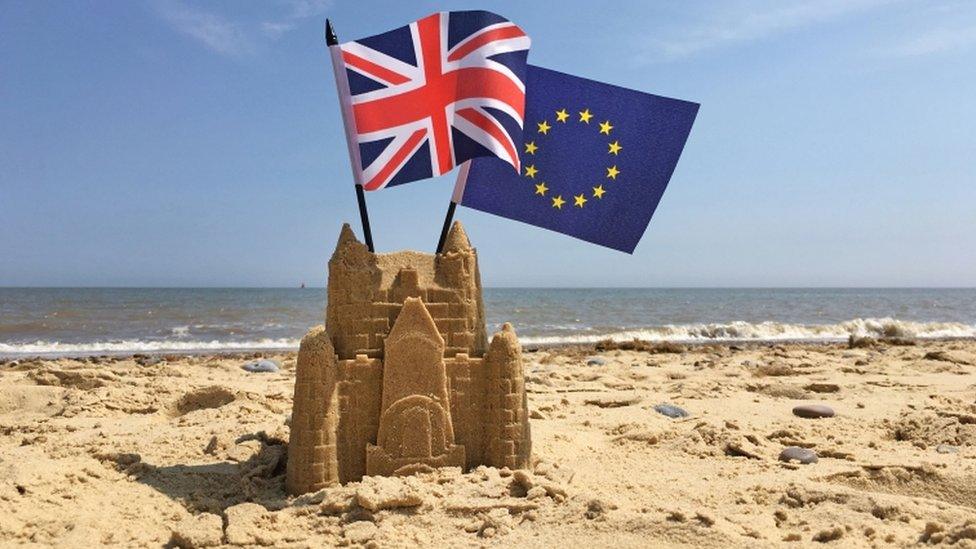
Our little archipelago of isles on the outer edges of a huge land mass has often thought of itself as rather special, even before it was the centre of an empire that changed the world.
As so often, Shakespeare put it best: "This precious stone set in the silver sea/ Which serves it in the office of a wall/ Or as a moat defensive to a house,/ Against the envy of less happier lands,/ This blessed plot, this earth, this realm, this England."
It is that silver sea that helps define our relationship with the rest of Europe.
These isles have very rarely been in isolation from it, whether splendid or otherwise. How could it be, as one historian recently argued, when the Magna Carta was signed by French nobles and the Bill of Rights designed for a Dutch prince?
But it has always kept a beady eye on other powers across the water.
It has been often concerned with stopping other European powers dominating the continent, playing one off against another.
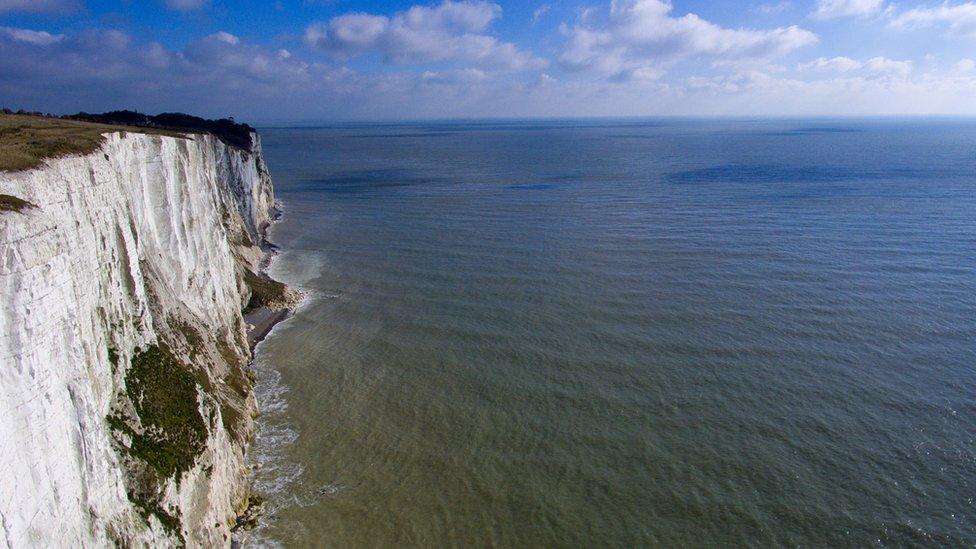
Looking out from the white cliffs of Dover across the English Channel
But from that physical separation flows a psychological distance too.
As the BBC's first Europe editor, I spent a lot of time thinking about our tricky relationship. After all, in my previous incarnation as a political journalist based at Westminster I had seen how some politicians' profound distaste for the evolving project of the European Union had blown back into British politics with profound and startling consequences.
I had watched as Margaret Thatcher's attitude towards the EU's nascent plans for a single currency, summed up by "no, no, no", had her own side bringing her down. It was the defenestration of a prime minister deeply beloved by most of her party.
I had reported for Newsnight as John Major's government was harried and hamstrung by those who rebelled against the Maastricht treaty. Europe meant it could do nothing. Blair's government was much friendlier, with any tensions buried by his own project.
Now Europe has claimed another scalp, that of a man who told his party to stop banging on about it. It will be the thing that David Cameron is remembered for - banging on about Europe, and losing the argument.
Now I know the European Union is not Europe. But those who stress that are missing the point. No, it is not the same as European culture. No it is not a geographically exact expression. But there are only a couple of European countries who are "out", and firmly intend to stay out. All the others, or at least their leaders, want a share in this deeply political expression of a dream.
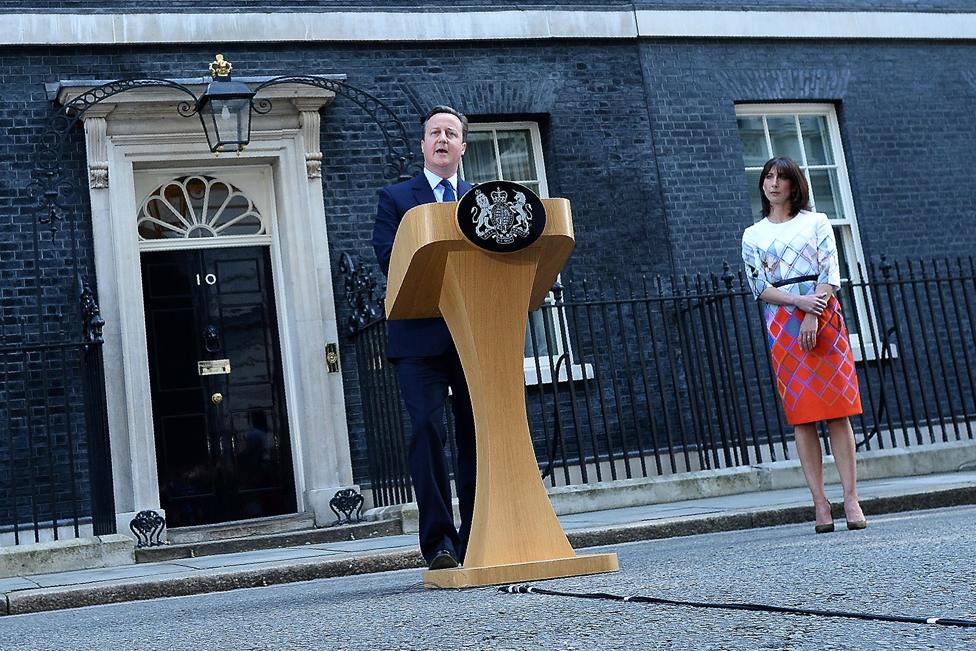
By the end of my time based in Brussels I was convinced that I had understood the key difference. To many in the UK being part of the EU was a hard-headed economic relationship, about free markets, selling and buying stuff. It was a sort of second best, a consolation prize after the loss of empire, but not one that had a similar place in patriots' hearts.
But for nearly all the other countries it was a refuge. It was a home they were constructing as a bulwark against history, against horror.
Germany was fleeing its role in spreading death and destruction to every corner of the continent, fleeing its own political ambitions. France was running away from defeat and occupation, from humiliation and powerlessness.
So were many other countries. Greece, Portugal and Spain found refuge - in an imagined future - from the real past of right-wing dictatorships. The countries of the East were replacing communist tyranny with a new attempt to create peace and democracy.
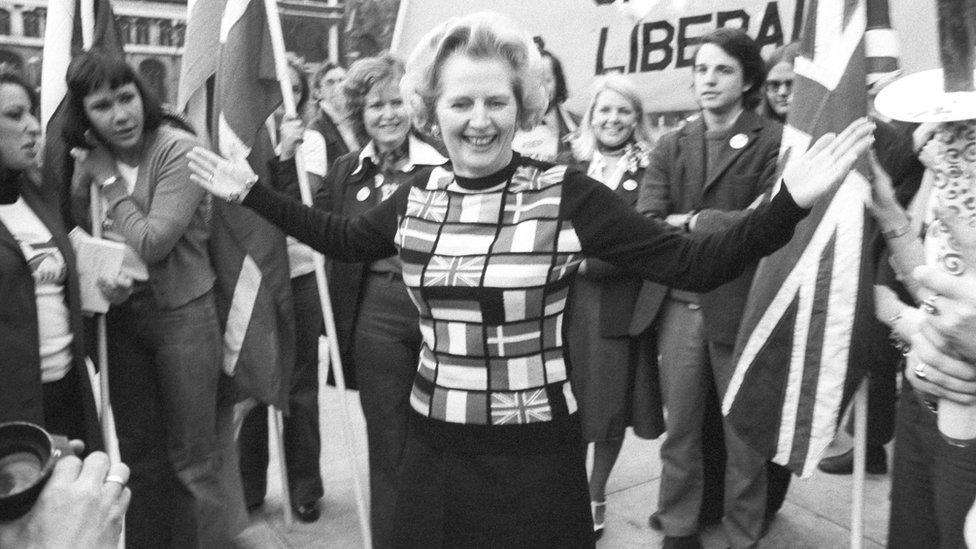
Many subtly changed their stance as the years passed
The thought that war could once again ravage a continent, so risible to David Cameron's detractors, do not seem so funny to many on the continent.
For many Britons, World War Two was our finest hour, standing alone, and putting those Europeans to shame, withstanding Hitler and beating him. Some realised the Russians and the Americans helped a little bit too. But we were still better than the rest of the Quislings and dictators.
The European Union, for all its bureaucracy, is a deeply romantic project, a desire to forge something new, something different. A new relationship binding nation states in a way that will exorcise forever the ghosts of the inglorious past.
I sat in a cafe next to some fairly senior people who work in the commission in Brussels. They were despairing of Brexit, making desperate, rather hysterical jokes about it and the future in Britain. But then one by one they confessed when they got up on Friday morning, switched on the news, checked their phones, they cried. Few in the UK would say that if another country left the EU.
But the irritations of these dozen or so people of different nationalities, with the UK - comments about British pride, warm beer and arrogant politicians - underlined a more fundamental frustration with British attitudes.
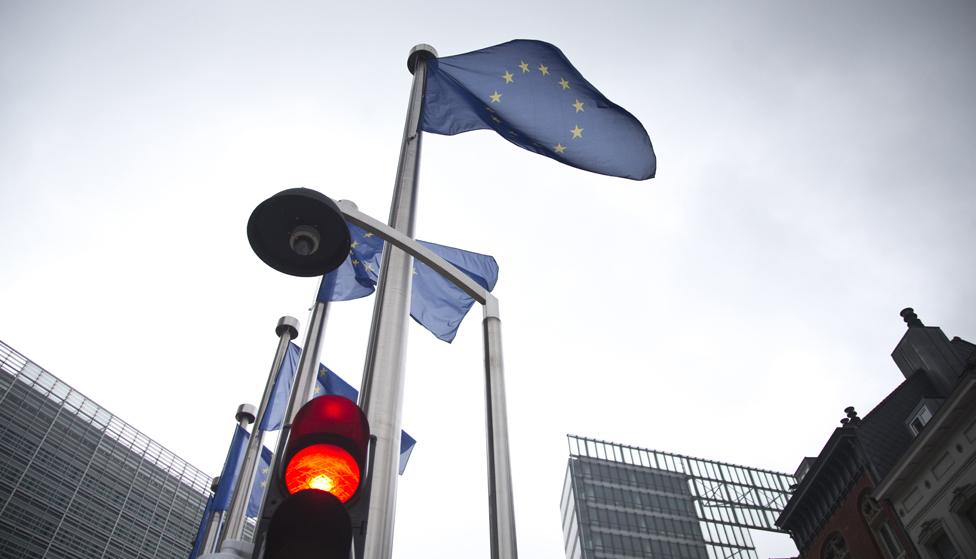
The EU headquarters in Brussels, 24 June 2016
These Spanish, and Swedes, a Belgian and a Hungarian, were all emoting and swearing and arguing in English. One said (in French) "maybe we can all go back to speaking French now". She was shouted down - in English - "that will never happen. English is the language of the European Union now."
I remember Neil Kinnock joking that the EU changed forever when the Swedes arrived and started saying "good morning" in the lift.
One might think that is trivial. But maybe it highlights something we rarely realise in our desire for hard power - the extent of our soft power. It also underscores a real frustration with the British that has been growing. Many in Europe think we've won. While readers of some British newspapers have been treated to stories of little Britain being bullied by the big commission, that is not how you see it if you are, say, Portuguese or Latvian.
Then you would see, time after time, Britain being given a special deal, treated with kid gloves and washed with buckets of soft soap.
They say we've won. We won and turned Europe on to a free-market, anti-statist, liberal economic agenda.

A short history of Britain in Europe
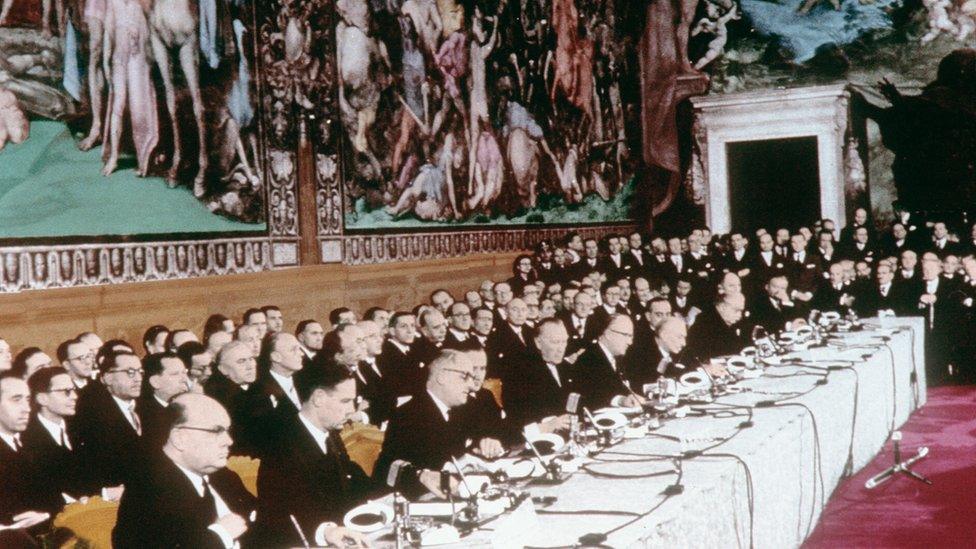
1951 - European Coal and Steel Community founded under the Treaty of Paris, as a a way to prevent future wars between France and West Germany
1957 - European Economic Community (EEC) founded under the Treaty of Rome (pictured) - original signatories are West Germany, France, Luxembourg, Italy, Belgium and the Netherlands
1963 - French leader Charles de Gaulle vetoes UK membership of the EEC (and again in 1967)
1969 - UK applies for a third time, this time successfully
1973 - UK joins the EEC
1975 - UK holds its first referendum on membership of the EEC; votes to stay a member
1991 - Maastricht Treaty formally establishes the European Union as a political body; the UK opts out of the Social Chapter, which governs employment rights
1999 - Single European currency adopted by 11 member states in 1999; UK does not join

We won on enlargement - the unlovely word for our insistence that the EU couldn't wait, and had to rapidly take in the countries of the former communist block.
Then there are those deals.
We are outside the Euro. Outside home affairs and justice rules. Outside the passport-free Schengen zone. David Cameron won a concession that we would be outside "ever closer union".
Now we want to be outside the whole shebang. Don't be surprised if the instinct of some is to make sure that we feel some discomfort on our way out.
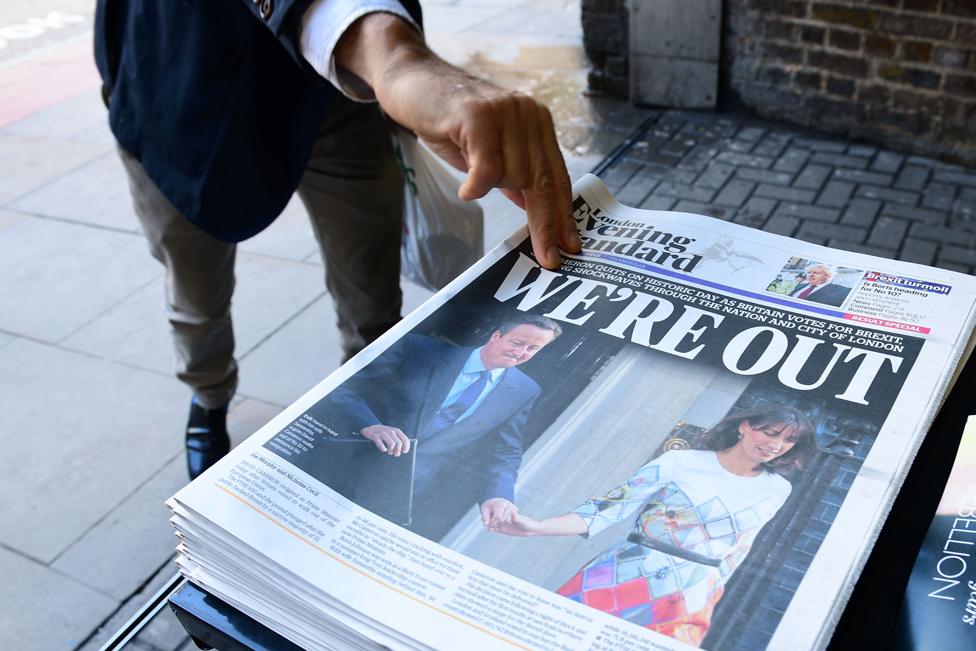
I realised something else during my time based in Brussels. The old caricature of those who were opposed to the EU was less and less true. They didn't base their arguments on dislike of foreigners. They professed to love Europe's variety and embraced its language and culture. It was the organisation they disliked.
Many of the political elites were snobby about these opponents, and felt the questions they were raising were illegitimate. They didn't engage with the argument but swept it under the carpet, turned a blind eye and hoped they wouldn't be heard.
The Dutch and French rejected the constitution in a referendum, but it was politicians from the UK who voiced the discontent some European voters felt.
What was once as rare in Europe as a dodo riding on a unicorn is now commonplace. All over Europe there is deep suspicion of the European Union.
It took the financial crisis to turn these new Eurosceptics into an alternative to the mainstream. But the very heart of their objection will not go away for the European Union - and it is difficult to see how it is solved.
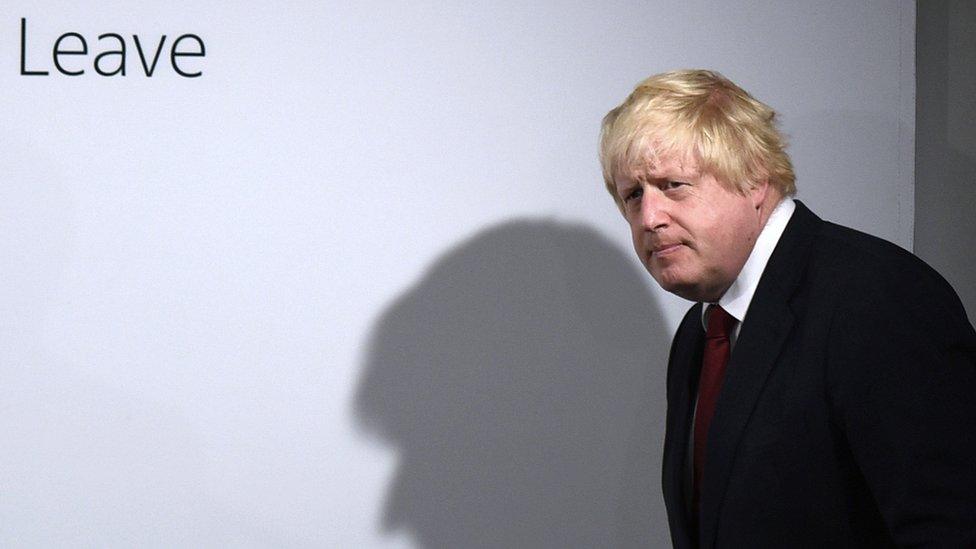
It is their old joke playing on the root of the word "democracy" - that the EU can't be a democracy as it has a "cracy" [rule] but not a "demos" [people].
Now, there is nothing either sacred or immutable about the nation state or people's fellow feeling towards others. Roman citizens felt Roman, even while not being what we would call Italian, let alone from the Eternal City.
During the Depression, as recorded by John Steinbeck in The Grapes of Wrath, people living in one US state, California, resented the poor from another American state, Oklahoma, moving there to work. Even though they were all Americans.
But it is undoubtedly true the UK's immigration debate and the Greek crisis are so heated because people don't feel the same connection, the same (often limited) desire to help people from other European nations, as they do those they define as their own.
That, not red tape or some ill-defined responsiveness, is the EU's central problem. It will have to start recognising it and wrestling with it rather than resenting it and ignoring it, if it wants to survive.
Indeed our exit leaves the European Union with multiple headaches. The threat of other countries following suit is perhaps the main one.
But it is what it does to Britain's old ambition that is perhaps more intriguing. It changes the balance of power.
Germany will almost certainly end up paying more. They will no longer be able to rely on the UK joining them and the Finns and the Swedes and the Dutch to join their side in an economic argument.
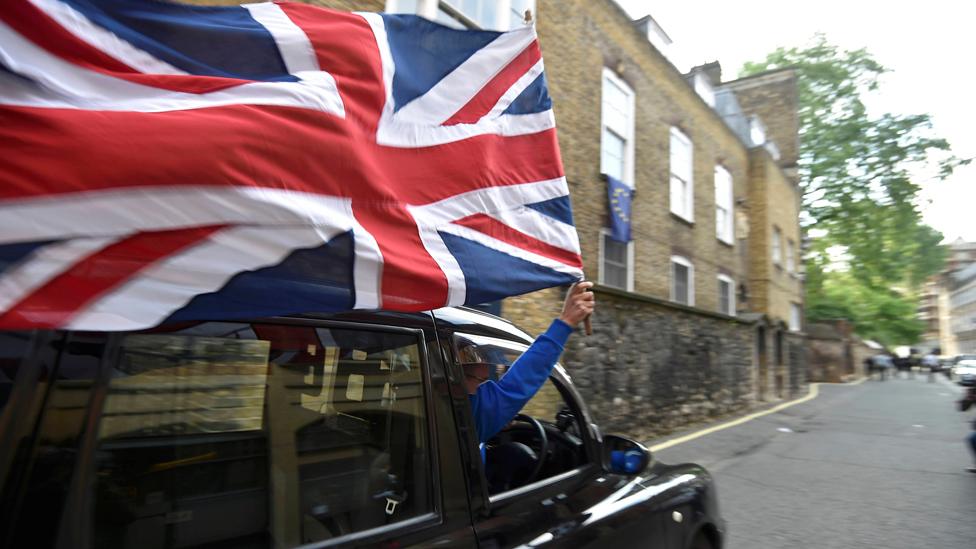
A hefty weight will soon be withdrawn from the balance. A straight North-South fight will become sharper.
Economic liberals may not like the result. But there is an even more central problem.
I thought it odd when Boris Johnson during the campaign was picked up for claiming that the EU wanted to fulfil Hitler's ambitions by other means. He was lambasted for the sin of mentioning Hitler, but not tackled on the central point he was making.
You could argue the very purpose of the EU is not to achieve continent-wide dictatorship from some Brussels bunker, but to prevent the domination of Europe by one power, namely Germany. Now modern Germany is sane and sober, cautious of military adventure and brutal power, to a degree rarely seen in other nations. There is perhaps little we need fear.
But the euro crisis and the refugee crisis shows that German political might is powerfully resented. As its past recedes it will inevitably act more openly in its own interests, less cloaked in an apparently altruistic care for the whole continent. Britain may have to watch from the sidelines, across the Channel, powerless to intervene, or offer guidance, unless by megaphone.
We see ourselves as separate, and so we shall soon be cut out of councils and commission that are still shaping a continent. Some in Brussels may reflect smugly on how John of Gaunt's speech in Richard II concludes: "That England that was wont to conquer others/Hath made a shameful conquest of itself."